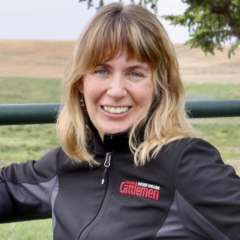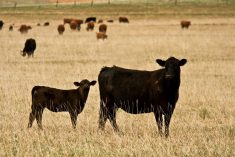As Canada’s beef farmers and ranchers face drought, industry leaders are trying to find ways to secure feed and help those forced to sell rebuild their herds.
B.C. ranchers are dealing with high temperatures that have “parched the grass that was there,” Kevin Boone, general manager of B.C. Cattlemen’s Association, said during a Canadian Cattlemen’s Association (CCA) online town hall on Monday.
On top of the drought slashing hay supplies, wildfires are burning prime grasslands, leaving ranchers with little summer or winter feed. B.C.’s southern Interior has been hit the hardest, with no significant moisture in the region since late March or early April.
Read Also

Mexico agriculture secretary says still no date for restarting cattle exports to U.S.
Mexican Agriculture Minister Julio Berdegue said on Wednesday that Mexico and the United States have not yet set a date to resume Mexican cattle exports amid an outbreak of the flesh-eating screwworm parasite.
Drought has a hard grip on the Prairie provinces, too. Arnold Balicki, Saskatchewan Cattlemen’s Association chair and long-time rancher, says it’s the worst drought he’s seen.
“In Saskatchewan, you can go down five inches, and there’s not a drop of moisture.”
Manitoba also has a widespread moisture deficit, says Tyler Fulton, Manitoba Beef Producers’ president, but conditions around the Interlake and southwest are “dire.”
Those areas haven’t had pasture for weeks and rain now “wouldn’t move the needle,” he said.
In Ontario, the farther north one travels, the drier it gets, with the Rainy River district holding the unfortunate distinction as most-scorched. That district was the first to declare a state of emergency, with other districts soon following suit.
Kim Jo Bliss, a farmer and crop researcher in the Rainy River district, said they’ve only received four millimetres so far this month. Typically, the area can count on about 12 inches of rain for the growing season, but some places have only had about two inches.
“I’m very concerned about this industry, and in particular the Rainy River district,” she said.
In Alberta, the heatwave, wind and ongoing lack of moisture have sped crop deterioration, said Dr. Melanie Wowk, Alberta Beef Producers chair, beef producer and veterinarian.
“We’re a very resilient industry but we need to ask for some help,” she said.
Requests are urgent
Industry leaders are worried that producers will be forced to sell mother cows due to the feed shortage. In Manitoba, producers are already selling cattle. Fulton said the cow losses will vary significantly between regions, but estimated that some regions could see 50 per cent of the herd lost.
“That’s the reality right now. And you just can’t solve the problem everywhere with a feed assistance type of program, I don’t think.”
One request is to not only enact the livestock tax deferral program but to expand eligibility to include other classes of cattle, such as replacement heifers, CCA policy and program manager Brady Stadnicki said.
The CCA and its provincial counterparts are also asking to extend the program beyond one year, giving producers more time to restock after the drought.
Stadnicki said that it’s “critical” that crop insurance staff and adjusters help producers with questions and requests “in a timely manner.” The CCA is also asking crop insurance agencies to create incentives to encourage farmers to salvage crops as livestock feed, without penalty.
One option is to raise the yield threshold at which crops can be salvaged for grazing or livestock feed, without negatively affecting a farmer’s coverage, as Saskatchewan did in mid-July. “We’d like to see this widely implemented across the drought-stricken provinces immediately.”
Another incentive, he said, could be premium rebates on next year’s coverage if farmers designate crops as livestock feed.
“This request is very urgent, given the closing window available to salvage feed.”
The Canadian Canola Growers’ Association and Grain Growers of Canada have joined the CCA in asking for crop insurance changes to enable crops to be diverted to feed, Bob Lowe, CCA president, noted.
Other requests include implementing programs to help producers get water to livestock on pasture — as water quantity and quality are increasingly becoming animal health and welfare concerns — and implementing AgriRecovery, a federal-provincial disaster relief program.
Marie-Claude Bibeau, the federal ag minister, has indicated the federal government was ready to receive submissions from provinces on AgriRecovery, a formal step needed to trigger the program.
Asked about rumours that U.S. producers were purchasing feed in Alberta, buoyed by transportation subsidies from the U.S. government, Stadnicki noted the U.S. has a national program to support its producers through forage shortages.
“We have shared this information with the federal government. As a bottom line, when looking at AgriRecovery support, it needs to be at the very least on par with the program in the United States” to prevent incentives to move feed south, he said.
U.S. subsidies for buying feed mean they’re getting “quite aggressive” at buying hay stocks, said Wowk. “And they are coming as far as northern Alberta for that.”
Wowk also noted that farmers’ production contracts and high grain values are another “stumbling block,” as contract buyers aren’t allowing farmers to defer delivery to next year. Wowk said it’s an area that needs to get “opened up” so livestock producers can access those crops.
“Time is ticking and we need answers like yesterday. And I’m just hoping people will realize the importance of this.”
— Lisa Guenther is the editor of Canadian Cattlemen.












